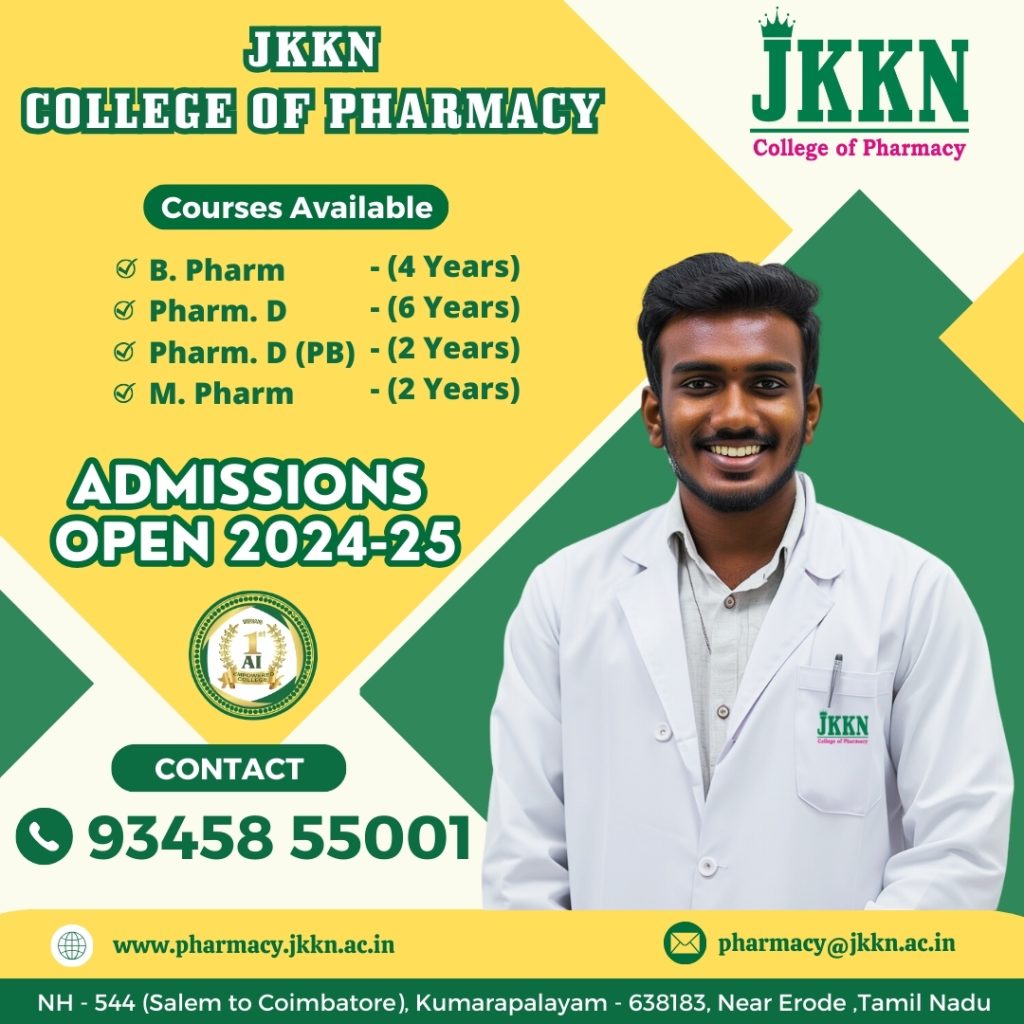Introduction
JKKN Pharmacy is a vital field in the healthcare industry, and the quality of education and facilities available in pharmacy schools are critical for producing competent and effective pharmacists. The quality of education and facilities at pharmacy schools directly impacts the skills, knowledge, and experiences of pharmacists-in-training, which ultimately affects the quality of care patients receive from pharmacists. In this article, we will explore the importance of quality education and facilities in pharmacy and how they can impact the profession and the health of patients.
Education in Pharmacy
The quality of education at pharmacy schools is crucial to ensure that pharmacists possess the necessary knowledge and skills to provide safe and effective medication therapy. Pharmacy education typically includes coursework in pharmacology, pharmaceutics, medicinal chemistry, pharmacokinetics, pharmacodynamics, and therapeutics. These courses provide students with a solid understanding of the basic science and clinical application of drugs, as well as the principles of drug discovery, development, and regulation. Additionally, pharmacy students are trained in patient communication, medication therapy management, and drug utilization review to enhance their clinical skills and prepare them for real-world practice.
A quality education in pharmacy should also include experiential learning opportunities, such as rotations in various healthcare settings. These rotations enable pharmacy students to apply their classroom knowledge in real-world situations and gain valuable practical experience. For example, pharmacy students may participate in hospital or community pharmacy rotations, where they can interact with patients and healthcare professionals, perform medication therapy management, and provide patient education.
Facilities in Pharmacy
In addition to education, the facilities available in pharmacy schools are critical to providing quality education and preparing students for practice. A well-equipped and modern pharmacy school should have state-of-the-art laboratories, classrooms, and simulation centers to provide students with hands-on training and practical experience. Advanced facilities can help students develop practical skills in compounding, drug formulation, and drug delivery systems.
Moreover, a quality pharmacy school should have access to a well-stocked and diverse library with an extensive collection of pharmacology and pharmacy-related literature. A comprehensive library can provide students with access to the latest research, publications, and resources, which they can use to enhance their learning experience.
The Impact of Quality Education and Facilities on Pharmacy Practice
The quality of education and facilities at pharmacy schools has a direct impact on the pharmacy profession and the health of patients. When pharmacists receive quality education and training, they can provide safe and effective medication therapy, which can lead to better patient outcomes. Moreover, advanced facilities can help pharmacy students develop critical thinking skills, which can enable them to identify and solve complex medication-related problems.
Quality education and facilities can also contribute to the advancement of the pharmacy profession. As pharmacists continue to play an essential role in patient care, they must stay abreast of the latest developments in the field, including new drug discoveries and emerging therapies. A well-equipped pharmacy school can provide pharmacists with the tools they need to keep up with the ever-evolving healthcare landscape.
Conclusion
In conclusion, the quality of education and facilities available at pharmacy schools plays a vital role in producing competent and effective pharmacists. A quality education in pharmacy should provide students with a solid understanding of the basic science and clinical application of drugs, as well as experiential learning opportunities in various healthcare settings. Additionally, advanced facilities can help students develop practical skills in compounding, drug formulation, and drug delivery systems. When pharmacists receive quality education and training, they can provide safe and effective medication therapy, which can lead to better patient outcomes and contribute to the advancement of the pharmacy profession.







